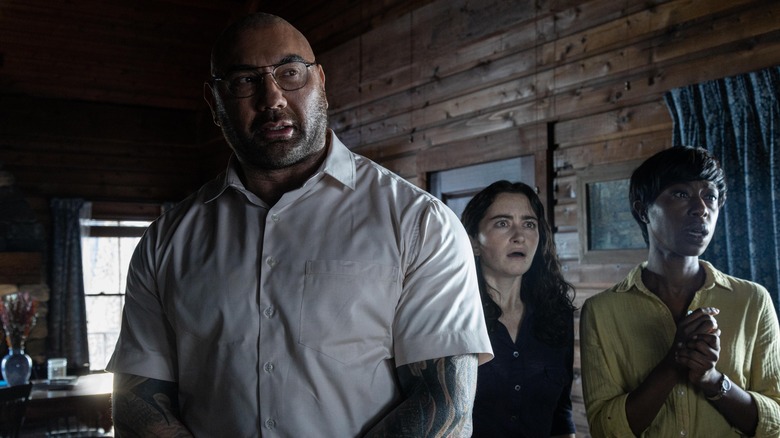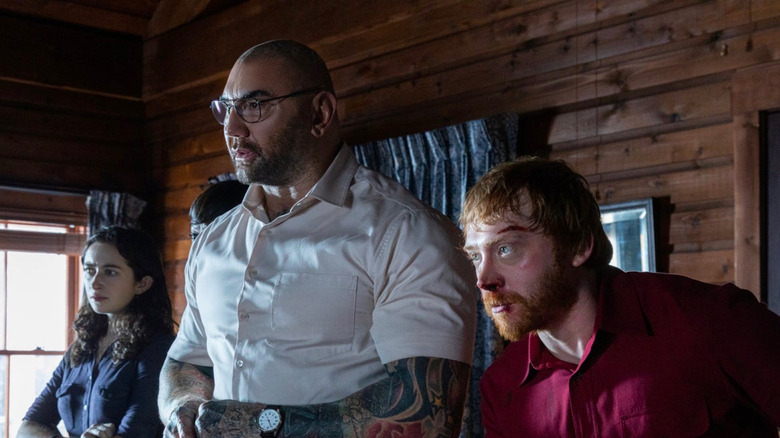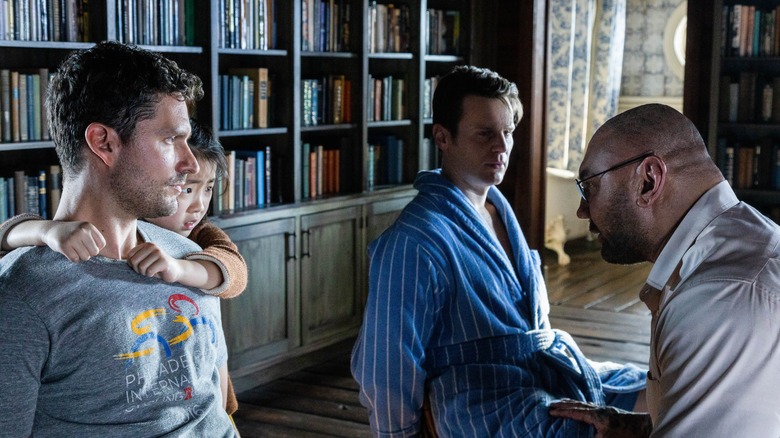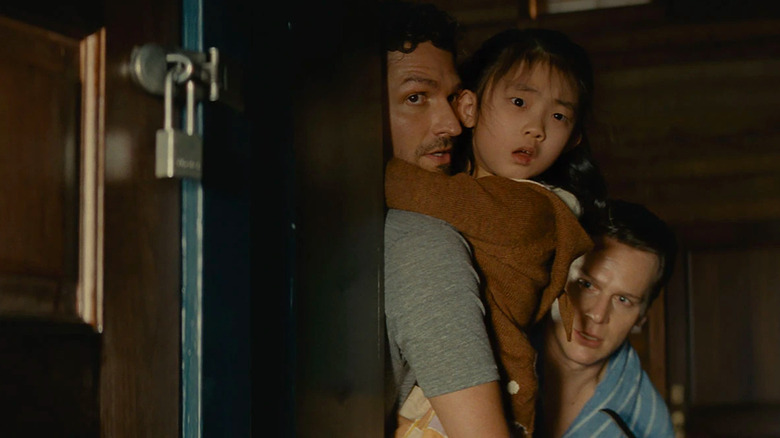
Watching the newest film from writer/director M. Night Shyamalan, "Knock at the Cabin," it's hard not to think of the weight carried by his past work. Though "Knock at the Cabin" is an adaptation of a well-regarded novel, it reflects a number of recognizable hallmarks that are easy to spot in Shyamalan's films. There is a precocious child whose presence grounds the thought processes of the adults surrounding them. There are stoic grown-ups who are sometimes prone to extremely dry humor and only at the most unexpected times. There is a touch of the supernatural. There's a surprise or two. And for some of us, by the time the end credits roll, "Knock at the Cabin" ends up feeling moderately hollow and empty. It is yet another Shyamalan film with a disturbing and effective setup that does not have a similar payoff.
"Knock at the Cabin" wastes no time creating a profound sense of unease, opening with Wen (Kristen Cui) catching grasshoppers outside the eponymous location before she sees a large man walking towards her. The looming stranger is Leonard (Dave Bautista), who has a relatively gentle air but is also ... well, a large stranger, and one who has brought three other strangers with him, who he deems "co-workers" instead of friends. And those three co-workers of his are all brandishing very odd but fierce-looking weapons. They have a very important job in front of them: to convince Wen's adoptive parents Eric and Andrew (Jonathan Groff and Ben Aldridge) that a) they have to choose to sacrifice one of their blended family trio, and b) kill the selected person. Why? Well, to stave off the apocalypse, of course. And the choice has to be made very, very soon.
Shyamalan and co-writers Steve Desmond and Michael Sherman, working from the novel "The Cabin at the End of the World" by Paul Tremblay, build a very suspenseful first act through this seeming home-invasion setup. Leonard is joined by Redmond (Rupert Grint), Adriane (Abby Quinn) and Sabrina (Nikki Amuka-Bird), all of whom combine to make an unnerving quartet, even if only Redmond, the most aggressive of the four, is genuinely creepy. But "Knock at the Cabin" begins to stumble when it deliberately avoids of some logical questions; questions that are barely raised by Eric and Andrew. Even at the start, Leonard and the others are painted less as cartoonishly insane and more as unwavering true believers. Leonard claims that the four of them — strangers until recently — all received the same set of horrific apocalyptic visions that led them to find each other and then the cabin.
Take It On Faith

But a great deal about how Leonard and the others found their joint purpose, and just knew to go to the cabin, is derived from faith. How did they find a message board that linked them and their visions? The details aren't important — just take it on faith that they did. How is it possible that they could have known the specifics of newscasters' reactions to tragedies like tsunamis and pandemic-like viruses? Again, just take it on faith.
And that's key because, as the film reaches its wobbly third act, the twist is that while Leonard and the others may be creepy, and they may be uncomfortable ... they are (within the confines of this story) correct. There is an apocalypse, one that gets closer with each time that Eric and Andrew refuse to sacrifice themselves or their daughter, and thus each time that one of the unwanted visitors is killed in front of them. (Redmond goes first, which partially explains why Grint — still Ron Weasley to so many of us — gets the "And" credit.) Throughout the first hour, it's easy to side with the especially angry Andrew if you're skeptical. The "proof" that Leonard gives to show that the apocalypse has begun is through clips, including one pre-recorded segment, of natural and man-made disasters that are inarguably grim and terrifying, but seem less like God's wrath than just the world having its revenge against humanity. (But Shyamalan already did that with his other R-rated film, "The Happening.")
The most unnerving images in the film, and the ones that are the firmest proof of Leonard and friends being correct, arrive just after Leonard becomes the only surviving member of his makeshift group. (Eric and Andrew later compare the quartet, shakily, to the Four Horsemen of the Apocalypse.) Leonard turns the TV on again — conveniently the cable still works, even if no one has cell phone service out in the forest — and shows Eric, Andrew, and Wen apparently live footage of passenger airplanes inexplicably falling out of the sky and then recites a newscaster's speech before the newscaster says anything.
Remarkable Performances That Can't Lift A Weak Third Act

Those who have read "The Cabin at the End of the World" will have further details to fill out, but even upon a cursory glance at the book's plot summary, there is clearly a very large difference in how Shyamalan's film retells the finale. In the book, while much of the above occurs, Wen is accidentally killed in a struggle, and once Leonard's crew is entirely killed off through various means, Eric and Andrew refuse to make a sacrifice between the two of them, heading off into the uncertain future. Here, Wen unsurprisingly is not killed (for all the gabble people make about CinemaScore ratings, can you imagine a version of this movie with her dying not getting an F?), and Eric winds up accepting that he should be sacrificed to stave off the end of the world. Since we already know that Leonard and friends were correct, Eric's offscreen death does stop the apocalypse (at least for now).
An easy critique on the work of M. Night Shyamalan is that while he's an excellent director — both of actors, teasing out great performances from unexpected sources; and of staging suspense in unnatural and distinctive ways — his writing is an albatross. "Knock at the Cabin" is far from his weakest film, considering how recently removed we are from the embarrassing 2019 film "Glass," let alone earlier efforts like "The Happening" and "Lady in the Water." Shyamalan, in depicting a story that mostly takes place in the same confined location, uses the camera in unique and uncomfortable ways. (Some of the extreme close-ups and direct-address shots to the camera recall the work of Jonathan Demme, whose longtime cinematographer, Tak Fujimoto, was the director of photography for Shyamalan's breakout effort, "The Sixth Sense.")
And whatever else is true, Dave Bautista's performance as Leonard is truly remarkable. In just a handful of disparate films, from "Blade Runner 2049" to "Glass Onion" to the "Guardians of the Galaxy" series, Bautista has proven himself to be a stealthily brilliant actor with untold depths. His work as Leonard is similarly superlative, as he carefully walks the line between fervent belief and extreme empathy. (And his introductory scene, while partially recalling the famous scene from the original "Frankenstein" in which the monster tries to play a game with a little girl, works quite well in terms of establishing Leonard's seemingly innate gentle qualities with children.)
Halfway There

But "Knock at the Cabin" refuses to allow any genuine doubt in favor of approaching a grimly inevitable finale in which the choice placed in front of Eric and Andrew at the start is made, just because. When Andrew realizes that Redmond is the same man who once brutally attacked him at a Massachusetts bar in a fit of violent homophobia, he's more firmly willing to think the worst of Leonard and the others. (Though there's meant to be a moment of doubt about whether or not Andrew is correct, a flashback scene and a driver's license prove that his memory is not faulty.) While Andrew remains the most doubtful of Leonard's claims throughout, he doesn't push as hard as you'd think a self-described human rights attorney would against the most ridiculous-sounding of claims.
There's also a contradiction at the core of how "Knock at the Cabin" presents itself versus what it actually is. As noted above, this is just Shyamalan's second R-rated film, and that implies something more intense than what's on screen. Though Shyamalan, like great suspense-building filmmakers like Hitchcock and Spielberg, is more prone to creating dread and tension by not showing something as opposed to hinting at it on the edges of the screen that we can't see, that tendency holds this film back. For being an R-rated film, "Knock at the Cabin" feels like it's not willing to go all-in on depicting violence on screen. In the same way that the film aims for enigma in some of its dialogue, so too does it feel enigmatic in showcasing how Leonard and his fellow true believers end up debasing themselves for the presumed greater good. None of the dead bodies are given much of a glimpse, and the most blood we see is when Andrew shoots and kills Sabrina (and even that blood is pretty minor, all things told).
Though the smallness of "Knock at the Cabin" is very much part of the point, it ends up lending a quality of emptiness to the proceedings once the end credits roll. (And though the repeated use of KC and the Sunshine Band's "Boogie Shoes" is meant to be sincere, its final appearance seems awfully glib instead. Perhaps too upbeat a song to imply the afterlife presence of a sacrificed father.) The performers are, as you would hope, pot committed to this work, and Shyamalan's directing skills remain as strong as ever. Even in his weakest films, his direction is enough to make things at least interesting from scene to scene. But "Knock at the Cabin," by the very nature of its source material, has to be an intensely challenging film for the audience as much as for the characters. It only gets halfway there in the end.
Read this next: The Best Thrillers Of 2022, Ranked
The post Knock at the Cabin Spoiler Review: A Film Unwilling To Get As Dark As It Should appeared first on /Film.
